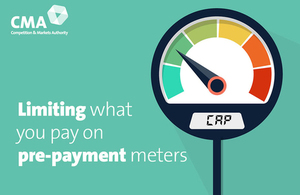CMA puts £300m saving in place for prepayment energy customers
The CMA has finalised details for the introduction of a price cap for approximately 4 million households on prepayment meters.

Prepayment meter
In its final report published in June following a two-year investigation into the energy market, the Competition and Markets Authority (CMA) said that it would introduce a price cap for prepayment customers from April next year. This will help keep costs down for some of the most vulnerable households in Great Britain and is expected to reduce their bills by around £300 million a year.
The CMA has today published a final order, following a consultation on the draft version in October, which sets out the technical details of how the price cap will be calculated and implemented so that it can come into force in April next year. After its introduction Ofgem will monitor and update the price cap.
Prepayment customers currently face bills that can be hundreds of pounds a year more expensive than for those on standard credit meters. The CMA’s investigation found that the cheapest available prepayment deals were £260 to £320 a year more expensive than those available for direct debit households.
The price cap will remain in place until the end of 2020 when the smart meter roll-out – combined with other changes imposed on the industry by the CMA – is expected to tackle issues that prevent such customers accessing the better deals available to others.
Roger Witcomb, Chairman of the Energy Market Investigation, said:
It is unacceptable that 4 million households on prepayment meters, many of them vulnerable, face higher bills than other energy customers. This price cap will provide a real help to those customers until the disadvantages they face are addressed by the roll-out of smart meters and our other requirements.
The CMA will publish final orders relating to some of the other measures resulting from the energy investigation later this month.
The CMA’s report detailed over 30 measures, including recommendations to Ofgem and government, which are to be brought in to drive down costs by increasing competition between suppliers and helping more customers switch to better deals. They will also include technical and regulatory changes to modernise the market and ensure it works in consumers’ interests.
The order and all other information published in relation to the investigation are available on the energy market investigation case page. A short overview of the investigation is also available, along with a range of other materials for consumers and businesses explaining the investigation and its findings.